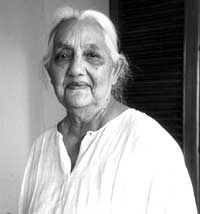BP spends his 40th wedding anniversary in Sundarijal prison, reflecting on his love for his wife Sushila. His mind is also on his defence, which he must start preparing. Whatever the ruling might be, BP wants his defence to be a testament to his political struggles and ideals.
[No entry 3rd February]  4th February 1977
4th February 1977
Sundarijal: Marriage Day 1937. I know you don't remember dates. If you remembered as I do, you would be transported to Shivalaghat at Varanasi where we were united exactly 40 years ago on this day-Shivalaghat where we found each other and thereafter remained united, through thick and thin, more thick than thin, in laughter and tears, happiness and misery, ecstasy and dullness, love and bitterness-but always united, drawing inspiration from each other, myself perhaps more than you. I vividly remember the day. No other day is imprinted on my memory as sharply as the 4th of February 1937. I recollect the faintest details of the all that happened on that day, including the clothes that you and I were wearing for the occasion. This is very surprising. During my long life many memorable events have occurred to me on many occasions and days. When I try to recollect then, I recollect them all right but they are as faded pictures, whose outlines are not sharp. They are dated, not fresh like the day of our wedding. Why? Dear, I remember you. A silent cry, like a prayer runs from my breast for you. I am alone here. 
5th February
Sundarijal: There was sunshine after yesterday's long rain. Yesterday I was in a reminiscent mood, remembering my marriage celebration and the developments of 40 years subsequent to and consequent upon that event. I relived in memory my days with Sushila-who grew from childhood to age under my protective care. Then I remembered her spirit of independence in her sensitiveness, her quiet and restive dignity, her almost obstinate adherence to her own truth and way of life-all these developments of her personality is some kind of assertion of her independence vis a vis my tutelage, I remembered her with passionate intensity and found myself falling in love with her afresh. Oh god, let her be as she is-let her not lose her dignity in her present state defenceless-let her be protected and happy and loving and be as she always has been. Let her health be good-at least let her not suffer the worst effects of high blood pressure. In my present gloomy mood, my imagination has become unhealthy and macabre. I imagine the worst of everything.
I read some pages of the science book most reluctantly. Copied some Sanskrit poems-fragments quoted in Basham's "Wonder that was India"-with a view to memorising them. Did daily duties as usual; and watched the day disappear ever so slowly.
Since we are going to be put on trial on some serious charges, we have to prepare our defence-which should be of political nature and reflective of our political credo. In case the worst happened, this defence may in time be our testament and a political document for the future of creation to derive guidance and inspiration to take up the threat of the democratic struggle. I have been ransacking my mind as to the ideological framework of such a defence. The difficulty is confounded because we are not sure it should be our testament-which one draws when one's part of the game is over. I don't know if our part of the struggle is over.


